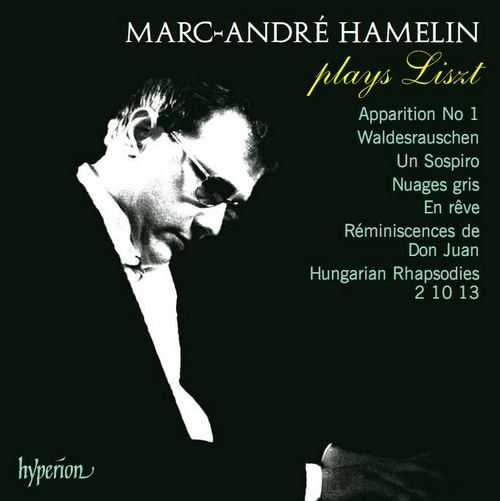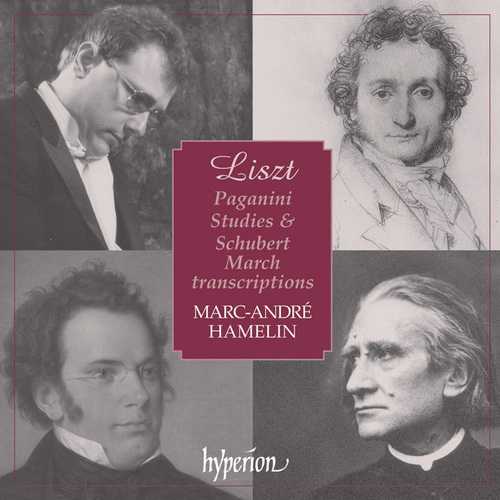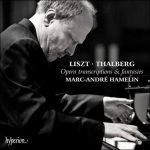
Performer: Marc-André Hamelin
Composer: Franz Liszt
Audio CD
SPARS Code: DDD
Number of Discs: 1
Format: APE (image+cue)
Label: Hyperion
Size: 156 MB
Recovery: +3%
Scan: yes
# Apparitions (3), for piano, S. 155 (LW A19) No 1
Composed by Franz Liszt
with Marc-Andre Hamelin
# Waldesrauschen (Forest Murmurs), for piano (Zwei Konzertetuden No. 1), S. 145/1 (LW A218/1)
Composed by Franz Liszt
with Marc-Andre Hamelin
# Un sospiro, for piano in D flat major (Grande études de concert No. 3), S. 144/3 (LW A118/3)
Composed by Franz Liszt
with Marc-Andre Hamelin
# Hungarian Rhapsody, for piano No. 10 in E major (I & II), S.244/10 (LW A132/10)
Composed by Franz Liszt
with Marc-Andre Hamelin
# Hungarian Rhapsody, for piano No. 13 in A minor, S. 244/13 (LW A132/13)
Composed by Franz Liszt
with Marc-Andre Hamelin
# Hungarian Rhapsody, for piano No. 2 (the “original” No. 2) in C sharp minor (I & II), S. 244/2 (LW A132/2)
Composed by Franz Liszt
with Marc-Andre Hamelin
# Nuages gris (Trübe Wolken), for piano, S. 199 (LW A305)
Composed by Franz Liszt
with Marc-Andre Hamelin
# En rêve, nocturne for piano, S. 207 (LW A336)
Composed by Franz Liszt
with Marc-Andre Hamelin
# Réminiscences de Don Juan (I & II), for piano (after Mozart: Don Giovanni), S. 418 (LW A80)
Composed by Franz Liszt
with Marc-Andre Hamelin
01. Apparition No. 1 In F Sharp Major S155 No. 1
02. Waldesrauschen S145 No. 1
03. Un Sospiro S144 No. 3
04. Hungarian Rhapsody No. 10 In E Major S244
05. Hungarian Rhapsody No. 13 In A Minor S244
06. Hungarian Rhapsody No. 2 In C Sharp Minor S244
07. Nuages gris S199
08. En reve – Nocturne S207
09. Reminiscences de Don Juan S418
Too Technically Immaculate for its Own Good
Playing the piano isn’t easy. ‘Really, for sure (as one wouldn’t know!)?’ Yes, definitely for sure. Playing Bach and Beethoven isn’t easy–playing Ravel and Messiaen even more so–playing Scriabin and Rachmaninov yet even more so–but perhaps the most difficult composers to play are Chopin and Liszt. ‘Why is that?’ Because their music is so masterfully composed with such immaculate understanding of the instrument. I would assert that throwing a Chopin or Liszt Etude or Ballade is the ultimate calling card to verify whether or not we’re dealing with an accomplished pianist.
In recent years, it has been increasingly acknowledged that Marc-Andre Hamelin probably is the overall most accomplished pianist currently alive–technically as well interpretatively. ‘Why then has it taken such time for people to pick that up–or even more to the point, why are there still so many allegedly learned musical people who refuse to recognise it?’ Well, my guess is the reason being the fact that Hamelin has focused almost exclusively on lesser-known works and composers, often so technically demanding that few other pianists have bothered even trying, hence, limiting the material for comparisons. ‘Any examples?’ Try any of his Alkan, Godowsky or Medtner and you will instantly know.
Against that background, this Liszt recital from 1996 is all the more welcome. I think I’ll just spell it out for you right away: I don’t think there is any other living (or dead) pianist that can play Liszt like this–at least I haven’t been able find any evidence pointing in any other direction. ‘Can you elaborate, please.’ Well, I haven’t heard any other pianist being able to negotiate all the myriad notes Liszt throw at the performer with such complete and unforced ease. ‘But his interpretations are not as profound as the likes of Arrau, Berman or Bolet!’ Wrong again, they are actually even more profound as Hamelin, by simple logic, finds himself more relative room to bring out the profoundness of the interpretations. ‘But his 13th Hungarian Rhapsody is more boring than Cziffra’s!’ Yes, indeed it is–until reaching the Vivace section, which is boiling and sparkling like no other version. As a matter of fact, virtually every single performance on this CD sets new standards–most notably so Waldesrauschen, Un Sospiro, the 2nd Hungarian Rhapsody and probably most of all Reminiscences de Don Juan.
All-in-all, here you have amongst the most consummate Liszt playing imaginable–so good that it sort of makes some people alienated or perhaps envious. At least, that’s a way of trying to understand such silly labels like ‘Focused on Virtuosity’, ‘the glass is half empty’, ‘Brilliant but flawed’ or ‘Technically superb, musically moribund’. All the same, these are better just ignored as they rather reflect shortcomings in the respective reviewers rather than this recording.
The Wigmore Hall recording leaves little to be desired. ‘But 62:37 is short measure these days!’ Then, jump right into Hamelin’s bonus cadenza for the 2nd Hungarian Rhapsody and you’ll find yourself gasping, jaw-dropping and cheering for another 10 or 15 minutes. Rest assured that you won’t find higher pleasurable returns per invested unit of money than this Liszt recital.



